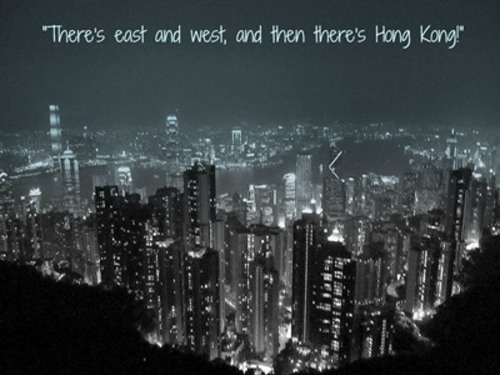
For this week's Top Picks, we are re-publishing a post by Joann Pittman originally posted to her blog, Outside-In, on September 30, 2014.
There's East and West, and There Is Hong Kong
Like many others, my journey to being a Sinophile began in Hong Kong. In the summer of 1979 I spent three months in the city on an internship, teaching English and working in the office of the Chinese Church Research Center. When not working, I explored the city, taking random bus lines to the far-flung parts of town. In the course of the summer, I fell in love with the city. I remember seeing a t-shirt in a tourist shop that I thought captured the essence of Hong Kong. It said "There's east and west; and then there's Hong Kong."
During the years I lived in China, I returned often to Hong Kong — for meetings, conferences, and to visit friends. I have the fun things I like to see and do when I'm in town: a trip across the harbor on the Star Ferry; ride Bus #6 from Central to Stanley Market (it's better than a roller coaster); eat fried rice or fried noodles in one of the seemingly millions of mom & pop noodle shops; stroll the waterfront in Tsim Sha Tsui.
Because of my love for Hong Kong (and my love for China), I am watching with great interest and unease the situation unfolding in Hong Kong this week. It's hard to explain what is going on in three sentences, but let me try. As part of the "One Country, Two Systems" formula agreed upon by China and Britain, the Chinese government promised direct elections in 2017. Recently they announced that the candidates would be chosen by Beijing. This did not sit well with Hong Kong citizens.
Of course, it is much more complicated than that, and there are issues of economics and national identity at play as well. Fortunately there is excellent reporting coming out of Hong Kong that delves into these complexities. If you're interested in some good reading on what is going on and what it might (or might not) mean for the future, I recommend the following articles to get you started:
Fate of Hong Kong Rests in Xi Jinping's Hands (September 29, 2014, Toronto Globe and Mail)
What happens in Hong Kong over the coming days will tell us a lot about where China is heading in the era of Xi Jinping. A negotiated solution that appeases some or all of the protesters would suggest China finally has the kind of leader that the Communist Party's undemocratic "meritocracy" was supposed to produce. The sidelining of Mr. Xi's enemies – and his own genuine personal popularity among ordinary Chinese – gives him the power to surprise everyone in how he handles the Occupy Central movement.
A crackdown, particularly one that involves use of the People's Liberation Army, would tell us China is in for another dark decade of stifling repression.
The Day that China Came to Hong Kong (September 29, 2014, China File)
Beijing has no good choices. The resignation of Chief Executive C.Y. Leung, one of the protestors' many demands, is no longer unthinkable; the Special Administrative Region's first Chief Executive, shipping tycoon Tung Chee-hwa, stepped down in 2004 after massive protests. But Leung's resignation would not solve the governance problem that entombs Hong Kong, that of a wealthy, well-educated city without an accountable government. If Beijing acts true to form, and in line with what we have seen to date from Xi Jinping, sustained protests could see Beijing order the Hong Kong government to end the protests, whatever that takes. On Sunday night, the government was forced to put out a statement denying that PLA troops, who are stationed in the city, were moving tanks in for action.
Hong Kong is different now.
Hong Kong People (September 29, 2014, The New York Times)
This past Sunday — when the phalanxes of riot police moved aggressively to clear the streets of peaceful protesters — Hong Kong became just another Chinese city. It was the moment when the "one country, two systems" formula Hong Kong was promised on its return to Chinese sovereignty in 1997 was finally laid bare as unworkable." […] But even as the protests continue to swell, Beijing seems to hold all the cards. Yet even if it succeeds in tamping down the anger in Hong Kong — which is unlikely — its gains can be fleeting at best.The moment that Hong Kong citizens have been dreading for 17 years has finally arrived.
The slogan I saw on that t-shirt 35 years ago seems even truer today.
Image credit: Jonathan Leung, via Flickr
Are you enjoying a cup of good coffee or fragrant tea while reading the latest ChinaSource post? Consider donating the cost of that “cuppa” to support our content so we can continue to serve you with the latest on Christianity in China.
